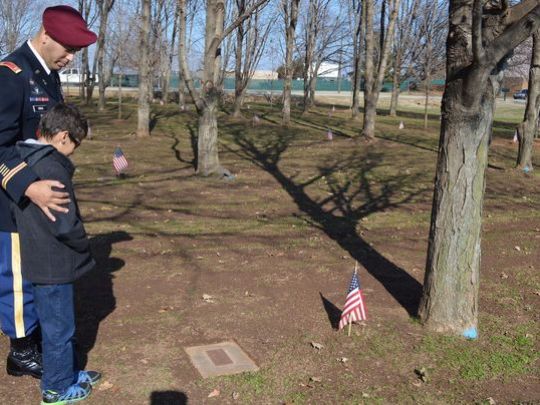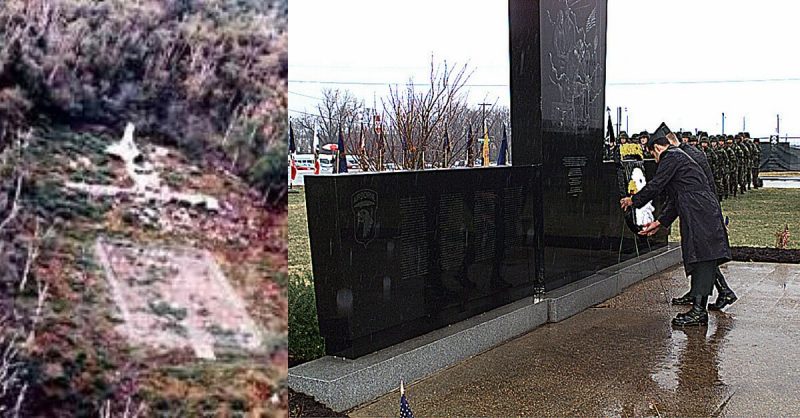On December 12, 1985, 248 US Soldiers from the 101st Airborne Division died in an airplane crash. They were on their way home from a peacekeeping mission in Sinai.
Shortly after takeoff from Gander en route to Fort Campbell, the aircraft stalled, crashed, and burned about half a mile from the runway. Of the 248 servicemen, all but twelve were members of 101st Airborne Division (Air Assault), most of whom were from the 3d Battalion, 502nd Infantry; eleven were from other Forces Command units; and one was an agent from the Criminal Investigations Command (CID).
One of the wives of the men said that her husband and the rest of the men were supposed to be gone for six months. However, they were lucky enough to get an early flight out. He called his wife, Gallo, before taking off; little did they know that was the last time they’d talk to each other.
Gallo recalls being informed after the crash; she was appalled by what it must be like to inform 248 families that their sons or husbands were gone. She said it was complete chaos.
This crash was considered one of the worst and deadliest in the Screaming Eagles Division history. The Canadian officials investigating the crash said the cause was most likely ice on the wings.
On the day of the crash, responsibility was claimed by Islamic Jihad, a wing of Hezbollah. According to United Press International “Hours after the crash the Islamic Jihad – a Shiite Muslim extremist group – claimed it destroyed the plane to prove [its] ability to strike at the Americans anywhere.” Pentagon and Canadian government officials rejected the claim, made by an anonymous caller to a French news agency in Beirut.
A memorial marking 30 years since the crash was held at Fort Campbell Memorial Park in Hopkinsville, Kentucky. Veterans, soldiers, and surviving family members all commemorated the anniversary and the death of the brave men. This anniversary will be the first time some of the families have visited since the day of the crash. It will bring the surviving families and veterans together to share with each other stories of their loved ones.
One of the commanders, Brett Sylvia, said that commemorating this anniversary is particularly important because the families and veterans still want to know those men are being mourned even after all of these years. Not one man has been forgotten. Sylvia said that the veterans attending can see how the army works, and the similarities in the earlier veterans’ experiences of war.
He hopes that each family member and veteran will see just how important those men were, as well as any other army veteran – past, present, and future.
Sylvia also explained that if anyone was to ask any of the surrounding townspeople what they remember about the crash, people will tell others exactly what time it was and where they were. That is how much the tragedy impacted not only the families, but also the townspeople near the crash.

Sylvia said he had hoped to see some of the community members at the memorial. He knows just how much of an impact the crash had on the community, and the community members know that their show of respect to the veterans, families, and widows can mean a lot to them.
Another officer, Richardson, said that if those men had any brothers, nephews, or children, they would have only been around five years old when the men died. He and a couple other commanders hope to find those children and tell them stories about the men who died. The officer said that this will be his personal challenge and he will see it through. Those people deserve to know as much about their relatives as possible.
Richardson was actually in Sinai at the same time as the men were. There were so many soldiers it would take almost three trips to bring them home. However, due to it being close to Christmas, he and the other men let all of the married men go first so they could be home for the holidays.
In a way, Richardson feels some amount of guilt because what he thought was a good idea at the time, to let the bachelors stay behind and the married men go ahead, turned out to be all the more tragic.
The first two planes were all filled with married guys; to Richardson, that was the worst tragedy of all. Not only did those men lose their lives, but their families also lost husbands and fathers. Richardson says that he and a lot of the men felt survivor’s guilt.
He said that it could either eat a person alive or it can bring them to do good things. This is why Richardson was determined to find the families and the children who lost a family member too soon.
